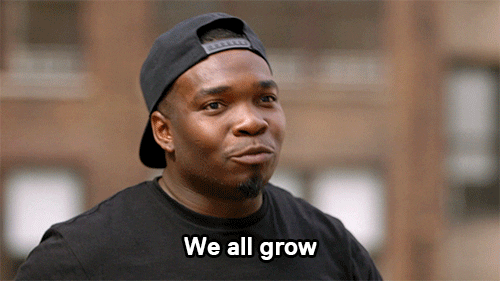Life is interesting. The very day that I sat down to pen this piece, one of my favorite YouTube channels, The Skin Deep, premiered a new episode between two friends—Lafi and Eboni. When it comes to the topic that's at hand, I don't know if growth spurts can get any more extreme than one friend who is a new mom and the other friend who is currently transitioning from female to male. And here's the thing, y'all—no matter what your personal feelings are on transgenderism, I still think the episode is worth watching—and pondering. One reason is because it's clear that the love and loyalty between these two individuals are rock solid. Second, I believe that their personal and friendship journey beckons us all to ask the question, "What would we do if a friend of ours made a significant life change?" Deeper still, "What would we do if they made a decision that we either couldn't relate to or perhaps didn't personally agree with?"
The interesting thing about the word "growth" is increase and development can mean different things to different people. So, while you're trying to maintain a friendship with someone who may define growth in a way that is different from your own, how do you discern the differences between growing together and growing apart?
As I watched the entire episode, one of the questions that I really liked was, "How has your love changed for me over time?" It served as a reminder that none of us are the same from five years ago; we'll also be different five years from now. As you're trying to balance how to maintain your friendships in the midst of you and your friends' growth spurts, here are some tips to help you both keep your connection intact.
Know That Growth Spurts Are Completely Normal

I know, right? When it comes to the world that we live in, what does "normal" even mean? I am going with that word from the angle of growth being a standard—it is a standard for all of us to experience things that will result in us expanding, evolving and, hopefully maturing. When those things transpire, we change. As we change, our relationships change.
One of the closest people to me, when we first met, we used to spend hours on the phone, talking about basically everything and nothing. But less than a year into our relationship, she got engaged. A few months after that, she got married. We then went from always being on the phone to constantly emailing one another. After the birth of her first child, emailing got a lot less too. As her life has shifted, we've had to come up with "new normals" in order for us to still nurture our relationship. Our friendship serves as a constant reminder that, if you live long enough, folks meet new people and cultivate relationships that alter their lifestyle. It can take some real getting used to but still, it is very normal.
Accept That Growth Spurts Are Oftentimes Uncomfortable—and Unpredictable

My youngest godchild is about to enter the cutting teeth stage of her development. We can tell because, for the most part, she's a pretty chill baby. But right through here, she's sleeping more and she's also more irritable than usual. The good news is she's about to get her first set of teeth. The sucky part is she's on the way to having a few months of pain.
Most of us want our friends to thrive in life. But when someone decides to start their own business, move to a new city (or country), take their relationship to another level, totally switch career paths, embark on doing things that will be better for their physical and/or psychological well-being—while the transitions are necessary, that doesn't mean that all of the newness doesn't take some real getting used to. In the midst of the growth, some things are going to be uncomfortable and unpredictable.
So, you know what that means. If your friend already doesn't know how to feel about what they are going through, they aren't going to be the best at offering up tips on how to help you adjust to their adjusting. The key is to remember that, just like teething, growth spurts come in waves; things won't be all topsy-turvy and disheveled forever. Try and be calm, supportive and not super sensitive. Things may be a little "weird" right now, but this too shall pass.
Also Accept That They Rarely Happen in Sync with Each Other

Remember how I said that a part of what comes with friendship is learning how to know the differences between when you are growing together or apart? It's my personal belief that some of us put unnecessary strain on our friendships because we don't factor in growth spurts into the dynamic. If you just took a job out of state and your BFF takes a new career path that has demanding hours, that doesn't automatically mean that the two of you are growing apart; it may just mean that you both need to be more intentional about making sure that you schedule time to catch up. If another friend of yours recently had a religious experience that altered their perspectives and perhaps even their value systems and, at the same time, you had a different type of spiritual awakening that changed you too, it doesn't mean that you both can't still coexist—you both just need to remember to respect one another's path and be open-minded to where you both are…now.
Some people end friendships that honestly could've went the distance if they had simply realized that, although they changed individually, that didn't mean that the friendship was doomed. It simply meant that the love and mutual respect that they shared had to make room for the friendship to transition a bit. That both individuals still need one another—just maybe in different ways than they did in times past.
Know That Patience and Open Communication Are Required

I've shared before that one of my all-time relationship-related quotes is, "People change and forget to tell each other." At this stage in my life, there are only a handful of people who I've been friends with since the turn of the century. My pregnancies changed me. Heartbreak changed me. Leaving corporate America to be a full-time writer changed me. Leaving the denomination that I grew up in changed me. Learning how to set some freakin' boundaries changed me. Letting go of toxic family members and releasing counterproductive friendships changed me. I could go on and on, but I think you get the gist.
As I think back on all of the changes, and the people who have rocked with me throughout each of them, I know for a fact that we wouldn't have made it through if it hadn't been for their patience ("the quality of being patient, as the bearing of provocation, annoyance, misfortune, or pain, without complaint, loss of temper, irritation, or the like") and commitment to listen to my needs as I gave them the stage to offer up their own as I was going through all of my transitions.
Real talk, some friends fall out because one or both people become impatient as they witness their friend's changes. But what my friends have shown me is when the love, loyalty and commitment are there, so long as the changes don't cause the friendship to become unhealthy, supporting your friend is the only real option you've got. And yes, that support requires quite a bit of patience and open communication. For a season, until everything settles, anyway.
Prepare for Some Things Needing to Shift Within the Relationship

One of my closest male friends is one of the most ambitious cats I know. It's like every six months or so, he's got another big idea that requires us to shift our talking schedules and it sometimes requires that I lend my support in a different kind of way. If he didn't bring so much consistency, confidentiality and outright joy to my life (because he is hilarious), it would be easy to let all of his professional changes to cause us to grow apart. But since I really do adore all of what he brings into my life, whenever he hits me up with the, "Hey, I'm on this right now", I have learned to respond with, "So, what do you need from me in this season?"
Different seasons have different purposes and needs. That goes for the weather; that also goes for relationships.
What a friend of yours needed from you last year may be totally different from what they need from you now. Same goes for you as it relates to how they relate to you. Handling one another's growth spurts can be so much easier if you're both simply willing to meet current needs rather than settling into the rut of doing what you've always done for one another. This tip alone? It can be a real friendship lifesaver. It really can.
Remember That Embracing Growth Is a Part of What Commitment Is All About

The more work that I do with married couples, the more that I admire marriage; especially when it comes to couples who have more than 10-15 years under the belt. Because man, what those marriages model to me is how much commitment is required to remain with someone who is constantly changing as you change.
I make it no secret that I am a control-freak-in-recovery and so, sometimes in times past, as certain friends would go through their own process of evolution, me not liking the changes would result in me almost punishing them for changing. It was like I was so accustomed to the predictability of things being a certain way that, when they weren't that way anymore, I would emotionally disconnect.
Being a marriage life coach has shown me that, one of the most profound ways to show someone just how "in this" you are, is to give them the space to grow while still remaining solid in your commitment to them. It's like saying, "While you're out here metamorphosing, I'm gonna be right here, having your back every inch of them way."
When people know that they've got individuals in their life who don't merely tolerate their growth spurts but actually embrace them, not only does it cause them to evolve; it evolves the relationship as well.
As the individuals grow, the friendship grows. And when both people keep that in mind in the midst of the turbulence of the growth spurts, the end result can be a truly beautiful, sacred and lasting thing. Something that all of us ultimately desire from our dearest friendships. See what growth can do?
Want more stories like this? Sign up for our newsletter here and check out the related reads below:
Allow These Things To Happen Before Calling Someone "Friend"
5 Things You Can Do Today To Be A Better Friend
According To Aristotle, We Need 'Utility', 'Pleasure' & 'Good' Friends
10 Things You Should Absolutely Expect From Your Friendships
Feature image by Giphy
- Why Do We Lose Friends As We Get Older? 7 Reasons Your ... ›
- Developmental Changes in Young Children's Conceptions of ... ›
- The Changing Nature of Adolescent Friendships Longitudinal Links ... ›
- Friendships Change: Growing More Comfortable with Endings ... ›
- When Friendships Change | Goop ›
- How Friendships Change Over Time - The Atlantic ›
- When Friendships Change, How To Cope : NPR ›
- How To Deal With Growing Apart From Friends You Still Care About ›
























